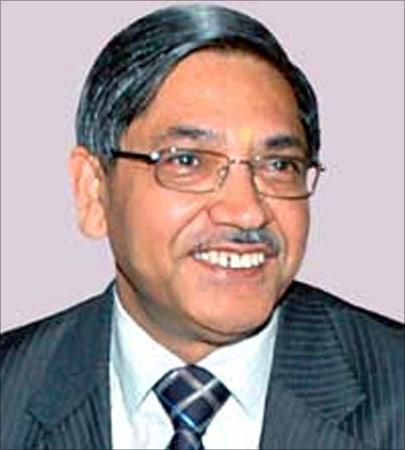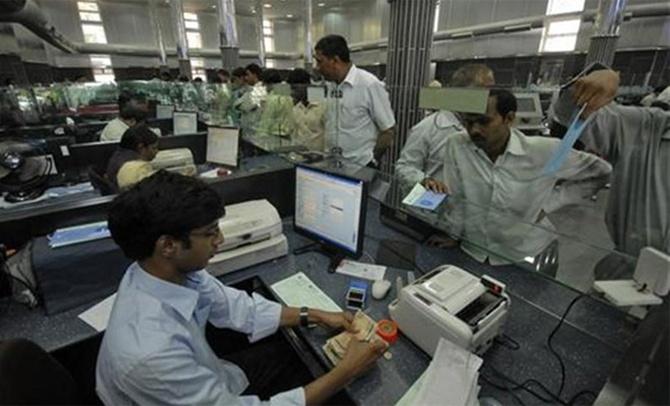Photographs: Hitesh Harisinghani/Rediff.com Manojit Saha
K C Chakrabarty, the outgoing Reserve Bank of India (RBI) deputy governor (Friday will be his last day in office), believes non-banking financial companies (NBFCs) can’t bring about financial inclusion; that job is best left to mainstream regulated financial institutions.
In an interview with Manojit Saha, Chakrabarty, who became RBI deputy governor on June 15, 2009, and sought a “slightly earlier departure” from the central bank, says a deputy governor’s job is less challenging than that of a bank’s chairman and managing director. Excerpts:
 What has been the progress on financial inclusion since you took charge as deputy governor? Which are the areas that need improvement?
What has been the progress on financial inclusion since you took charge as deputy governor? Which are the areas that need improvement?
Financial inclusion has two aspects— access and use of banking services. In the first phase, we have been reasonably successful in increasing access to banking.
The total number of villages with access to banking services has risen to about 300,000 from 67,000 at the end of March 2010, when we started the planned approach to financial inclusion and banks were asked to prepare plans in this regard. The number of basic savings bank accounts has increased by about 200 million.
The number of rural branches, which fell by 4,000 between 1990 and 2007, has increased by 10,000 since then.
The number of transactions has also increased. It will increase further when a proper ecosystem is in place, for instance, when state governments start to transfer all benefits through bank accounts, if banks streamline the operations of business correspondents, etc.
Of the new accounts opened, transactions are taking place in 25 per cent. Our objective is by 2016, everyone in the country should have access to banking services.
The ‘use’ of banking services is a continuous process. This, too, is showing signs of improvement. Earlier, we had 2.5 million transactions a year; now, that number is recorded in a month.
'Granting bank licence to corporates can be tricky'
Photographs: Reuters
Has the business correspondent (BC) model worked?
The total number of bank branches isn’t more than 110,000. Whatever progress has been made is because of the BC model, without which we could not have reached 300,000 villages.
Should banks be allowed to have a subsidiary exclusively for financial inclusion?
If a bank can do business through a subsidiary route, why cannot they do it departmentally? What is financial inclusion? It is providing banking services. So, are you saying a bank will provide banking services by creating a subsidiary? Creating an institution for the poor has never been successful on a commercial basis.
...
'Granting bank licence to corporates can be tricky'
Photographs: Reuters
One of the recommendations of the Nachiket Mor committee on financial inclusion is NBFCs should have a key role in financial inclusion. What’s your view?
According to RBI’s definition of financial inclusion, NBFCs cannot bring about it.
Our definition says such financial inclusion should be brought about by mainstream regulated financial institutions. NBFCs can play the role of a facilitator, as penetration is an issue for banks.
I don’t think NBFCs have a great business model to succeed. Also, globally, shadow banks are under criticism. My view is NBFCs can become BCs.
...
'Granting bank licence to corporates can be tricky'
Photographs: Mukesh Gupta/Reuters
Why do you say financial inclusion can only be carried out by mainstream entities?
Financial inclusion will not happen without an element of cross-subsidisation, and that should be provided by banks that have the ability to do that.
Second, financial inclusion demands access to banking services at reasonable costs, which can be done by regulated entities alone. If you charge Rs 25 for transferring Rs 500, that is not financial inclusion.
...
'Granting bank licence to corporates can be tricky'
Photographs: Amit Gupta/Reuters
In terms of currency management, what are the key challenges in delivery?
Last-mile delivery is a big issue. Distribution of currency/coins is a big issue. This is because we have left it to RBI and banks. RBI focuses more on distribution; as a result, it is unable to monitor whether banks are doing it or not.
The view of the government-constituted high level committee on currency management, which I chaired, is we must use private parties (the franchise model) for distribution. We have already done it for foreign exchange and that has worked well.
...
'Granting bank licence to corporates can be tricky'
Photographs: Reuters
In the wake of rising non-performing assets (NPAs), is there a need for a re-look at governance issues in banks?
It is not only NPAs; banks aren’t able to carry out financial inclusion and priority sector lending and offer better customer service—-all these are governance issues.
Banks are not able to carry out efficient financial intermediation; that, too, is a governance issue. Banks are not able to manage, not able to govern. They have not made people accountable, including boards. Those who don’t deliver must be held accountable.
To make people accountable, we first have to create the proper ecosystem. We have to select fit and proper persons to head banks and give them adequate time, autonomy and flexibility.
Unless we create this system, governance will not improve. We also need to redefine the role of the board, the bank’s chairman, its chief executive, etc.
But public sector banks say their remuneration is not market-driven.
I am all for market-related remuneration. But selection should also be market-driven. For the selection of the chief executive, there should be advertisements.
It cannot happen under the present disposition. For example, a promotion to the top post in State Bank of India (SBI) is from within the bank. Nowhere in the world will you get market-related remuneration if the selection is limited to that domain.
...
'Granting bank licence to corporates can be tricky'
Photographs: Reuters
Are you indicating the SBI chairmanship should be thrown open to candidates from other banks, too?
All I am saying is look at global best practices. Globally, vertical movement in the same organisation is disappearing.
If you have to move vertically, you have to criss-cross the path. For the appointment to the post of SBI chairman, let there be newspaper advertisements, so that candidates from other banks can also apply.
...
'Granting bank licence to corporates can be tricky'
Photographs: Jayanta Dey/Reuters
Before becoming the deputy governor of RBI, you headed two public sector banks. Which of the jobs was more challenging?
Both were challenging assignments. But I would say the deputy governor’s job is less challenging. In our system, the Number 1 has all the responsibilities.
So, if I faced any problem in RBI, I could push the paper to the governor, whereas as a chief executive, I couldn’t do so.
But in terms of learning, it was a great experience as deputy governor. I would not have learnt how the central bank functioned and I would not have got global exposure.
Also, I have met some great minds such as Mario Draghi and Ben Bernanke. I have learnt how the international financial system works.
...
'Granting bank licence to corporates can be tricky'
Photographs: Danish Siddiqui/Reuters
Industrial houses were not given licences this time. Why is the corporate sector still ineligible to enter the banking business?
Policy-wise, we have said the corporate sector is eligible.
But corporate houses weren’t given licences.
At this stage, they are not ‘fit and proper’, according to our criteria. Granting licences to the corporate sector is a tricky affair anywhere in the world.
But we have taken the step; we are open. But they must stand the test of ‘fit and proper’.










article